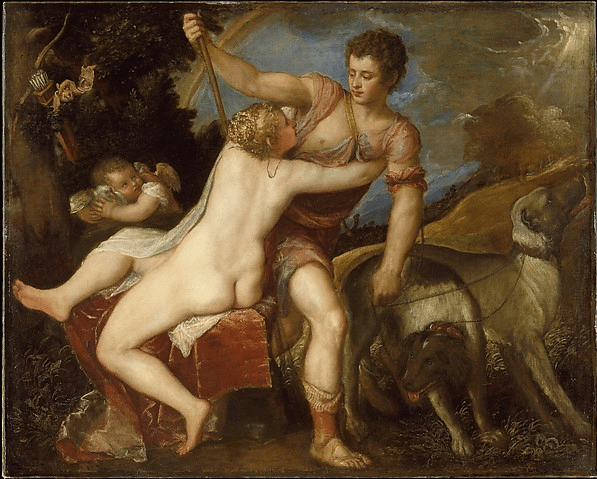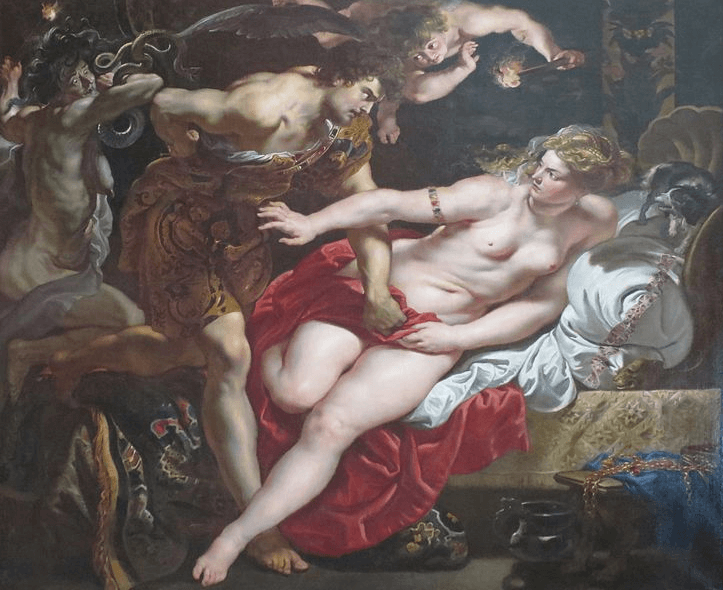
On Tuesday 27th May we held our fourth Raku Raku Eigo session at Kotobukiya, Rakurakuen. It was the best attended event so far, with English-language students from three community centres (Ajina-dai, Koi-ue and Suzugamine) and two guests from the USA, Megan and Michelle, who are studying at Jogakuin Women’s College this year.
The session began with my attempt to give a brief account of the basic theme of a book by the Irish poet Ted Hughes, Shakespeare and the Goddess of Complete Being.
According to Ted Hughes, the themes of two of Shakespeare’s early poems, Venus and Adonis, and The Rape of Lucrece, were combined by Shakespeare into a single myth, which provides the inspiration for the plots and themes of many of his plays.
While Ted Hughes’ hypothesis is quite complex, the plots of Venus and Adonis and The Rape of Lucrece are quite basic…
Venus and Adonis
The story is told by the Roman poet Ovid in his Metamorphoses. The goddess of beauty, Venus, falls in love with the lovely youth Adonis. She warns him to take care while hunting, but he ignores her, goes hunting with his dogs and chases a boar. The boar, wounded by Adonis’ spear, turns and chases him. Adonis runs, but the boar gores him in the groin with his tusk. Adonis falls, dying, to the ground. Venus laments over his body and turns him into a blood-red anenome.
According to Ted Hughes, Shakespeare modified the myth so that, in his poem, Adonis rejects Venus and struggles to escape from her, just as (1) Shakespeare’s patron, Southampton had rejected Shakespeare’s passion for him and (2) Protestant England had rejected the Roman Catholic cult of Mary.
The Rape of Lucrece
The story is told by Ovid and the Roman historian, Livy. Tarquin, and his cousin Collatine, lead a Roman army to besiege the city of Ardea. Here is how Ted Hughes tells the story:
On a wager, the Roman commanders leave the siege to see what their wives are up to in their absense. It turns out that all are making merry, in a variety of licentious ways, except for Collatine’s wife, Lucrece… Prince Tarquin is instantly possessed with uncontrollable lust for this uniuqe, inacessible treasure. He returns unaccompanied to her house, where Lucrece entertains him royally, as a friend of her husband and a prince.
During the night, Tarquin enters her bedchamber with his sword drawn. He tells Lucrece that if she does not sleep with him he will kill her and her servant and say that he had found them in bed together. He then rapes her.
After Tarquin leaves, Lucrece writes to her husband telling him what has happened. She then commits suicide.
Ted Hughes’ Interpretation of Venus & Adonis and The Rape of Lucrece
According to Ted Hughes, the myth of Venus and Adonis works as a “source myth” for Roman Catholicism, told by Shakespeare from a Protestant perspective in which the goddess is rejected by a virtuous young Puritan.
On the other hand, the rape of Lucrece works as a Protestant source myth (the destruction of Roman idolatory) seen from a Catholic point of view, in which the attack on the Roman church is reconfigured as rape.
Mr Morikawa’s Gift of Hanazake
Meanwhile, Mr Morikawa had obtained permission from the cafe staff for us to “try” a bottle of Hanazake (literally, “Flower Water” but more like “Fire Water”) which he donated to the session.
Hanazake is a type of Awamori liquor. Awamori is a speciality of Okinawa. Hanazake is distilled on the island of Yonaguni, Japan’s westernmost island, and is 120 proof (60% alcohol) so it is flammable. Awamori is aged in traditional clay pots to improve its flavor and mellowness and used to be reserved for religious ceremonies.
It certainly helped us enter into the spirit of things at Kotobukiya, washed down with bottled Löwenbräu, or Kotobukiya’s home-made ginger ale, or consumed in Michelle’s case as a “blueberry juice cocktail”.
The Sailor Who Fell From Grace With The Sea (午後の曳航)
Mrs Kanda (Ajina-dai kominkan) talked to us about Yukio Mishima‘s novel, Gogo no Eikou, and compared its graphic violence and allegorical commentary to that of The Rape of Lucrece.
Some terms arising from this part of the discussion were:
orikousan – お利口さん – a good child.
shirafu / sumen – 白面 / 素面 – sober – literally “without a mask”. Mrs Kanda explained that in kendo, if you play “without a mask” you have to take it seriously. We compared that idea with the English idea that it is drinking that removes the mask of sobriety.
jyaku – 邪鬼 – wicked. We compared the terms “wicked” and “evil” and concluded that Mr Morikawa was “wicked” for bringing Hanazake to a Raku Raku Eigo session, but not “evil”.
kimyou – 奇妙 – strange, queer, curious
Other Topics…
Various conversations bubbled along simultaneously. Mr Amano (Koi-ue kominkan) alluded to the theme of our previous class, in which social networking prior to the Internet was said to consist of having a drink with your mates in the pub.
He also mentioned Proust’s Rememberance of Things Past as part of a “revaluation of aestheticism,” which I think was connected to my mentioning that it is sometimes difficult to keep in mind that Rudyard Kipling and Oscar Wilde were more or less contemporaries.
I talked about Kipling’s Captains Courageous, which Kipling wrote while living in America. I mentioned that I had been surprised to learn that he also wrote Jungle Book in the depths of a north American winter when the snow lay deep around his house.
Megan and Michelle then mentioned that they both liked George of the Jungle, a cartoon parody of Tarzan…
Michelle comes from Ohio and at some point we talked about Lake Erie. I remembered Chrissie Hynde of The Pretenders singing about Lake Erie, but I confused her lyrics with those of another singer singing about another lake and how it was drying up, which is not the case with Lake Erie.
I later found out that Chrissie Hynde comes from Ohio and as Megan said she liked The Pretenders, here they are performing “Day After Day,” which includes the line “Over the city and lake Erie…”:
The session broke up around 6pm. The Japanese party left. I fetched my daughter and we had dinner with Megan and Michelle in Sanukiya, the udon shop conveniently located right next door to Kotobukiya!
Thank you for coming and contributing, everybody!
DH

